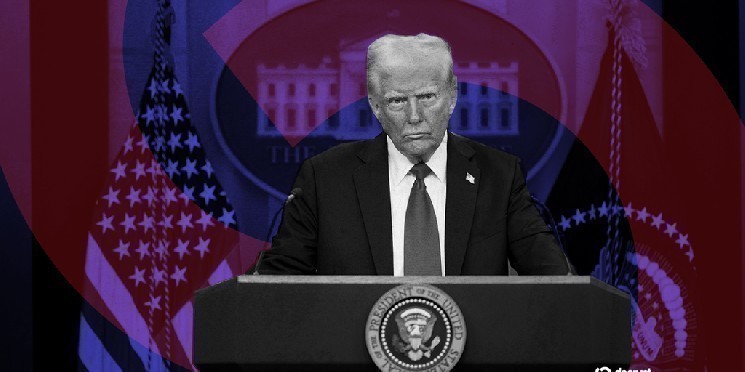Wall Street Milestone: Canary Capital Files for First Direct TRUMP Meme Coin ETF
Pioneering Move Marks Significant Development in Crypto-Financial Integration
In an unprecedented development for traditional financial markets, crypto fund manager Canary Capital submitted a groundbreaking application Tuesday to list the first exchange-traded fund (ETF) directly exposed to President Donald Trump’s meme cryptocurrency. The application represents a potential watershed moment for the intersection of mainstream finance, cryptocurrency, and political branding in American markets.
The proposed Canary TRUMP Coin ETF would provide investors with complete and direct exposure to the TRUMP token, establishing a new frontier for cryptocurrency integration with conventional investment vehicles. This filing distinguishes itself significantly from previous attempts to create TRUMP-based investment products, potentially creating a path for the controversial cryptocurrency to gain legitimacy within regulated financial markets despite its recent price volatility.
Direct Exposure vs. Previous Approaches: A Critical Distinction
Canary Capital’s filing represents a significant departure from earlier attempts to create TRUMP-based investment products. While two previous ETF providers applied to list TRUMP exchange-traded funds earlier this year, those applications took a fundamentally different approach to regulatory compliance and asset exposure.
The earlier applications were filed under the Investment Company Act of 1940, which would have prevented direct exposure to the cryptocurrency itself. Instead, these vehicles proposed investing in Cayman Islands subsidiaries that would hold TRUMP tokens alongside more stable assets like U.S. Treasuries to balance risk. This approach effectively created a buffer between investors and the actual cryptocurrency.
In contrast, Canary’s application was submitted under the Securities Act of 1933, proposing an investment vehicle entirely and directly exposed to the president’s meme coin. This distinction carries significant implications for both regulation and investment structure. Under this model, a reserve of actual TRUMP tokens would need to be maintained under strict custody requirements, likely within the United States, creating a direct link between the ETF’s performance and the underlying cryptocurrency’s market movements.
Regulatory Hurdles and Expert Skepticism
Despite the groundbreaking nature of the filing, market analysts remain skeptical about its approval prospects. Bloomberg ETF analyst Eric Balchunas highlighted a significant regulatory obstacle Tuesday, noting that non-security assets underlying spot ETFs typically need to first trade as futures ETFs for at least six months before direct spot ETF approval. This established regulatory pathway has been followed for other cryptocurrency ETFs, most notably with Bitcoin and Ethereum products.
“No such TRUMP futures products have yet traded for that amount of time,” Balchunas noted, suggesting the application may be premature under current SEC precedents. However, the analyst did acknowledge the possibility that TRUMP could eventually be incorporated into a more diversified ETF offered through the 1940 Company Act framework, which might present a more viable regulatory pathway.
The application places the Securities and Exchange Commission in a particularly delicate position as it navigates the intersection of financial regulation, cryptocurrency policy, and potential conflicts of interest. Since January, the SEC has reportedly followed presidential directives to adopt a more permissive approach toward cryptocurrency projects and companies, marking a significant shift in regulatory posture from previous administrations.
The SEC’s Evolving Stance on Meme Coins
The SEC’s handling of meme cryptocurrencies has undergone notable evolution in recent months, creating a complex regulatory backdrop for Canary’s application. When questioned in February about potential regulation of the president’s personal meme coin project, Republican SEC Commissioner Hester Peirce suggested the token likely fell outside the regulator’s jurisdiction, signaling a hands-off approach to the cryptocurrency.
This position was formalized weeks later when the SEC issued a comprehensive statement declaring all meme coins to be non-securities, effectively placing them beyond the agency’s regulatory authority. This categorical exemption represented a significant departure from the SEC’s previously cautious approach to cryptocurrency classification and enforcement.
Should the SEC ultimately approve the formal integration of the president’s meme token with Wall Street through this ETF, it would constitute a remarkable and potentially unprecedented development in U.S. presidential history. The convergence of presidential branding, cryptocurrency speculation, and mainstream financial products raises novel questions about the boundaries between political, personal, and financial interests at the highest levels of government.
Market Performance and Future Outlook
The proposed ETF comes amid significant volatility in the TRUMP token’s market performance. Since its January debut, the cryptocurrency has experienced a dramatic decline, plummeting over 70% in value. This substantial depreciation raises questions about investor appetite for a dedicated investment vehicle tied directly to the token’s performance.
Despite these market challenges, industry analysts have predicted that SEC leadership is likely to approve other spot meme coin ETFs before year’s end, potentially creating precedent for Canary’s application. However, the regulatory body has recently delayed final decisions on several similar applications, suggesting a measured approach to this emerging investment category.
The Canary TRUMP Coin ETF application represents more than just another cryptocurrency investment vehicle—it embodies the increasingly blurred lines between traditional finance, digital assets, political branding, and regulatory oversight. As Wall Street and Washington navigate this uncharted territory, investors, regulators, and market observers will be watching closely to see whether this unprecedented fusion of presidential branding and financial innovation ultimately receives regulatory blessing.
Whether approved or rejected, the application marks a significant milestone in the ongoing evolution of cryptocurrency’s integration with mainstream financial markets and raises important questions about the future relationship between political figures, personal business interests, and regulated investment products in the United States.


